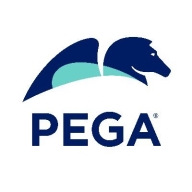

Pega Platform and IBM BPM compete in the business process management and case management category. Pega seems to have the upper hand due to its unified architecture and ease of use, appealing to enterprise-level solutions.
Features: Pega Platform's strengths include advanced case management, integration adaptability, and rapid deployment, which enhance user satisfaction. Its low-code functionality and automation also contribute to its appeal in enterprise solutions. IBM BPM excels in process orchestration, its ability to integrate seamlessly with various IBM products, and its comprehensive process management capabilities.
Room for Improvement: Pega users cite the need for better RPA capabilities, enhanced UI, and simpler integrations; some find it complex for non-developers. IBM BPM users highlight the need for simpler integration, reduced complexity, and cost improvements, especially for non-technical users.
Ease of Deployment and Customer Service: Pega offers flexible deployment options with on-premises, cloud, and hybrid setups, promoting efficient resource management. Most feedback on its customer support is positive, despite occasional delays. IBM BPM uses mainly on-premises deployment and faces challenges with component integration and updates, noted for adding complexity. Customer service responsiveness varies among users.
Pricing and ROI: Pega's pricing is considered high but justified by its features and ROI for large enterprises, with flexible licensing options that may still be costly for SMEs. IBM BPM is also expensive, with a complex pricing model requiring substantial upfront investment, mainly accessible to larger companies.
The customer service is outstanding.
We had a contract that provided on-site support, which was very satisfactory.
The technical support from Pega is very low, rating a one or two out of ten.
I never needed support from the platform standpoint, but if additional features are required, we have regular meetings with the product team for feedback.
Pega's technical support team is very helpful.
The solution has scalability issues; on a scale, I would rate it at eight out of ten.
I found IBM BPM to be scalable to a certain level but it struggled with large volumes of concurrent transactions.
IBM BPM also lacks smaller solutions, so I must purchase multiple solutions to start with workflows and applications.
Pega introduced Constellation, which allows a user to build a more engaging visual experience.
My learning curve in robotics has been challenging.
SAP is more expensive, but IBM BPM is very expensive.
The pricing is expensive, and this is an issue.
Pega is priced higher than open-source options like Flowable but is suitable for large-scale industries like banking and insurance.
The integration capabilities of IBM BPM are excellent.
Management capabilities such as dashboards.
Pega Platform is excellent for enterprise-level solutions with integrations to entire systems, including case management, service orchestration, CRM, decision-making capabilities, digital process automation, and AI-driven functionalities.


IBM BPM is a business process management tool that provides a robust set of tools to author, test, and deploy business processes, as well as full visibility and insight to managing those business processes. The solution provides tooling and run time for process design, execution, monitoring, and optimization, along with basic system integration support. To support various levels of complexity and involvement with business process management, there are two different editions of the product: IBM BPM and IBM BPM Express.
IBM BPM Features
IBM BPM has many valuable key features. Some of the most useful ones include:
IBM BPM Benefits
There are many benefits to implementing IBM BPM. Some of the biggest advantages the solution offers include:
Reviews from Real Users
IBM BPM is a solution that stands out when compared to many of its competitors. Some of its major advantages are that it’s good for developing complex apps, is robust, and has helpful team management and process performance features.
Zoran C., Owner/CEO at IT SPHERE, says, “It is perfect if you have to develop complex apps without much coding (only java script). It is also good if you don't have much IT resources in your company and would like to involve business analysts in the process of developing apps. My opinion is that it can do about 50% of all developers' work.”
Suhas V., BPM Architect at GBM, mentions, “Overall the solution is robust and has the ability to integrate with any product for complex workflows."
A BPM Consultant at a financial services firm comments, "Some of the features that I like the most are team management and process performance. They are both very useful and very powerful with regard to the workflow."
A Digital Banking & Innovation Director at a financial services firm expresses, “The processing functionality makes it easy to change processes and workflows easily.”
Pega Platform facilitates business process management, case management, and workflow automation for industries like banking, insurance, and healthcare. It supports digital transformation and customer service enhancements with its low-code capabilities and seamless integrations.
Pega Platform enables users to create efficient systems for case management, financial operations, and digital transformations. It provides tools for client onboarding, quoting, claims processing, customer experience improvements, and content management. Pega's low-code approach allows for the automation of complex processes, making it suitable for enterprises looking for adaptability and rapid deployment. While it offers strong real-time analytics and decision automation, users acknowledge challenges in user interface, integration, and performance aspects. High costs and a learning curve need attention, and enhancements in AI features and cloud services are desired.
What are the key features of Pega Platform?In banking, Pega Platform automates loan processing, accelerates customer onboarding, and manages compliance. Insurance companies benefit from streamlined claims processing and policy management. Healthcare sectors use the platform for patient engagement and care coordination, enabling organizations to adapt quickly to changing industry requirements.
We monitor all Business Process Management (BPM) reviews to prevent fraudulent reviews and keep review quality high. We do not post reviews by company employees or direct competitors. We validate each review for authenticity via cross-reference with LinkedIn, and personal follow-up with the reviewer when necessary.